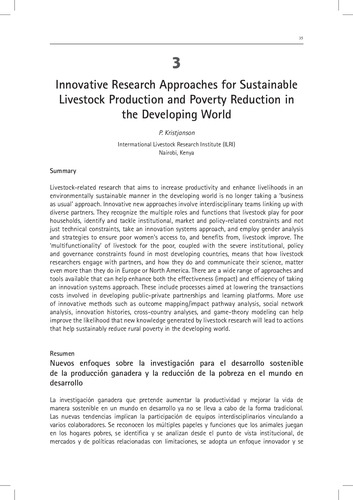Innovative research approaches for sustainable livestock production and poverty reduction in the developing world
Abstract
Livestock-related research that aims to increase productivity and enhance livelihoods in an environmentally sustainable manner in the developing world is no longer taking a ‘business as usual’ approach. Innovative new approaches involve interdisciplinary teams linking up with diverse partners. They recognize the multiple roles and functions that livestock play for poor households, identify and tackle institutional, market and policy-related constraints and not just technical constraints, take an innovation systems approach, and employ gender analysis and strategies to ensure poor women’s access to, and benefits from, livestock improve. The ‘multifunctionality’ of livestock for the poor, coupled with the severe institutional, policy and governance constraints found in most developing countries, means that how livestock researchers engage with partners, and how they do and communicate their science, matter even more than they do in Europe or North America. There are a wide range of approaches and tools available that can help enhance both the effectiveness (impact) and efficiency of taking an innovation systems approach. These include processes aimed at lowering the transactions costs involved in developing public-private partnerships and learning platforms. More use of innovative methods such as outcome mapping/impact pathway analysis, social network analysis, innovation histories, cross-country analyses, and game-theory modeling can help improve the likelihood that new knowledge generated by livestock research will lead to actions that help sustainably reduce rural poverty in the developing world.

